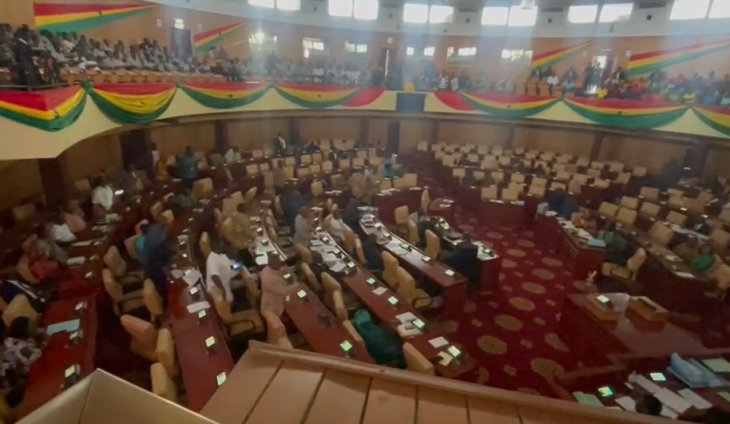The Minority in Parliament has voiced strong opposition to the proposed Legislative Instrument (LI) aimed at regulating cement pricing in Ghana.
This LI, sponsored by Trade and Industry Minister K.T. Hammond, has faced resistance from cement manufacturers who have urged Parliament not to approve it.
Minority Spokesperson on Legal and Constitutional Affairs, Bernard Ahiafor stated that the regulation contradicts the parent act, which covers standards for all goods and services.
“The parent act by its objects deals with all goods and services, that is setting the standard for all goods and services including the cement, and the understanding of the standard is controlling the quality of all goods and services produced and imported in the country.”
According to the spokesperson, the GSA is responsible for setting quality standards, not controlling prices.
He stated that selling is different from pricing of goods and services.
“We are of the view that if the LI is allowed to pass through parliament which will set the price of cement, then equally all goods and services produced in the country must go through price control because you cannot single out only cement when the parent law is dealing with all goods and services.”
According to Mr Ahiafor, there are domestic remedies which should be used to address these concerns instead of resorting to legal action.
“So when there are domestic remedies available, why do you then resort to the court? If everything in parliament would have to end up in court, then it means the court will gradually be converted into parliament. Whatever work that Parliament is supposed to do, it ends up in court; that is not how it happens in other jurisdictions.”
“So l believe we sometimes need to jaw- jaw then we come to amicable solutions".
The spokesperson stated that there are determinants used in the pricing of goods and services.
He pointed out that the depreciation of the local currency and rising interest rates are affecting the costs of raw materials.
“So if you used to buy raw material at 12 cedis, today, you're purchasing the raw material at 16 cedis. So if purchasing the raw material outside the country costs you 12 cedis, and you have to sell the goods at 15 cedis, to make a profit together with other recoverable and today, the price of the same raw material has moved to 16 cedis, what do you think will happen to the price of the products?" he quizzed.
He also noted that the government has to find a way of dealing with prices of goods and services rather than using a method of price control.
“The cement producers, for instance, have taken the decision, that they will just produce a small quantity of cement so that whoever can illegally purchase it at the price that they will sell it to make a profit should come for it and put it somewhere in the black market."
“And if you're looking for the cement in the system and you are not getting it, but you need it because it is an essential commodity, what it means is that you would have to resort to that particular black market to be able to purchase the product.”
“I don’t think that as a country we need to be introducing laws that will take us back into price control regime.”
He explained that the Ministry does not have the required personnel to check the pricing of the product all over the country.
“Maybe cement in Accra may be 90 cedis, but by the time the cement gets to Zebilla, it is 120 cedis.”
According to him, the price of the cement may be influenced by transportation and the current prices of fuel.
“So if you are not controlling the price of fuel, the price of fuel is going up. How do you get the transporters to be able to transport the cement to wherever it is needed without adding up to the cost of the cement?”
“Who will be there to determine that after incurring costs bringing the cement to wherever it should go, the price should be the same as how the factory is setting the price.”
Latest Stories
-
Prof. Kwaku Asare shoots down Fiscal Council proposals
3 minutes -
2024/2025 GPL: Holy Stars, Nations FC game abandoned after violence
5 minutes -
GPL 2024/25: Heart of Lions keep slim title hopes alive with win over Bechem
6 minutes -
2024/25 GPL: GoldStars beat Berekum Chelsea to enhance title hopes
17 minutes -
From superstars to synergy: What PSG teaches us about success, ego, and building systems that work
19 minutes -
2024/25 GPL: Accra Lions relegated following defeat to Dreams FC
21 minutes -
GPL 2024/25: Albert Amoah hits hat-trick as Asante Kotoko beat Medeama
30 minutes -
CSA blacklists 40 loan apps for harassment and data abuse
52 minutes -
Armwrestling and Fire Service forge development partnership
1 hour -
Fuel prices to fall significantly from June 1, 2025
2 hours -
Pan-African Progressive Front rolls out plan to unite Africa
2 hours -
Muslim women urged to help curb substance abuse in Zongo communities in Aflao
2 hours -
2025 HitzFMRepUrJersey records massive success
3 hours -
Death toll from Nigeria flash floods rises to 151
3 hours -
Kumasi, Tamale airports extend operational hours
3 hours

